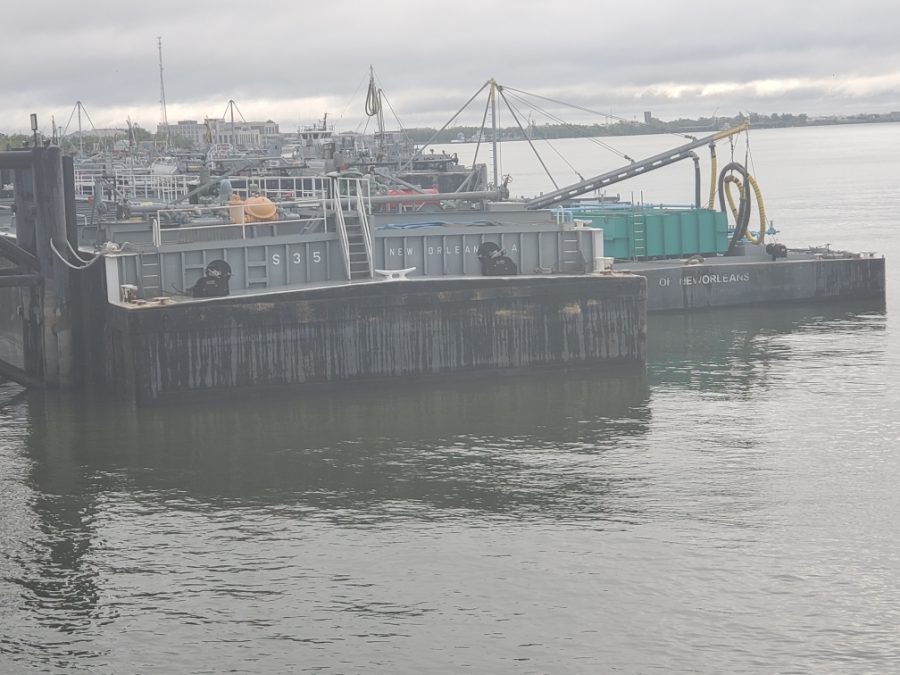Environmentalists address Mississippi River’s water levels
A barge on the Mississippi in New Orleans show devastatingly low water levels.
November 11, 2022
With temperatures rising due to climate change and a severe drought affecting the country, the mighty Mississippi River’s water level is at its lowest in a decade, forcing numerous parishes, including Orleans, to declare a state of emergency.
In addition to severe drought conditions in several states, sea levels are rising along the coasts. These factors trace back to the climate crisis, which is causing salt water from the Gulf of Mexico to wedge into the river. This directly affects several parishes’ water supply, rendering it practically undrinkable.
While the U.S. Army Corps of Engineers has already begun looking for solutions, such as dredging an “underwater sill” across the bed of the Mississippi River to prevent a thrust of salt water from entering from the Gulf of Mexico, environmentalists and climate activists believe that the real solution is to slow down the long-term effects of climate change before it’s too late.
Veronica Del Bianco, an environmental program professor at Loyola, said that lower than average rainfall for months on end is the main cause for this crisis.
“The river needs rain to replenish, and I’m not talking about rain here, like we had on Saturday,” Del Bianco said. “The Mississippi River is fed by tributaries across 31 states, and parts of Canada, and it’s precipitation there that affects water levels down here.”
These low water levels are causing barges, cruise ships, and cargo ships to bottom out in the river, making it practically impossible for them to reach their destinations.
More navigation restrictions imposed by the U.S. Coast Guard as a result of these incidents have farmers, river pilots, chemical plants, and many others concerned about their income and employment. Some rely solely on these waterways to transport more than 500 million tons of cargo each year, which also includes a majority of the country’s food supply. As a result, barge and cruise ship traffic is congested.
Craig Hood, director of the Environment Program at Loyola, said that the entire climate system has been disturbed by things like fossil fuels, which is why the country has been experiencing this drought. He also said that, as a result of the disruption in the climate system, the accumulation of rain received last winter was minimal due to the heavy and fast rainfall.
“It’s important to understand these connections of climate change and its effects on the land, water, and all of the other things we depend upon,” Hood said.
Hood said he wants students to recognize how essential the Mississippi River is to all of its bordering states, and that without it, there would be little to no economy.
“Most people don’t understand that the river is everything,” Hood said. “New Orleans, Baton Rouge, and all of the businesses in between would not exist without the Mississippi.”
Local climate activist Malik Rahim said he believes that saving the environment is the biggest issue mankind has ever faced and that the low levels of the river may give some time for the Gulf of Mexico to heal from pollution.
“So goes the Gulf, so goes America. And so goes America, so goes life as we know it. You cannot think about saving the gulf without thinking about the Mississippi River,” Rahim said.
Del Bianco said that while currently there is no real way to solve the economic and climate issues we are facing, there are ways we can help mitigate it, one of them being to go out and vote.
“I encourage everyone to research their candidates and their positions on issues related to water boards, energy production, and consumption, particularly within their own home state,” Del Bianco said.
Biology junior Isabella Ramos agreed with experts that things can change in this approach, but few people are ready to pay the price.
“Why would oil tycoons switch to having wind farms in the middle of the ocean instead of oil rigs when they make so much money?” Ramos said.
Ramos said she feels like some politicians are too caught up in their own regimes to care about or even want the change.
“Politicians have to support the oil industry in order to get money for their campaigns, and that’s why so many of them claim (climate) change isn’t even real,” Ramos said. “Climate change is real and it’s here – just look at the Mississippi.”










John smith • Nov 13, 2022 at 6:51 am
Low Water Records
(1) -1.60 ft on 12/27/1872
(2) -1.40 ft on 01/09/1877
(3) -1.20 ft on 12/30/1876
(4) -0.90 ft on 12/27/1917
(5) -0.80 ft on 11/24/1879
Recent Crests
(1) 17.25 ft on 05/10/2019
(2) 16.99 ft on 03/19/2018
(3) 16.48 ft on 05/31/2017
(4) 15.23 ft on 03/21/2016
(5) 17.38 ft on 05/19/2011
Historic Crests
(1) 21.27 ft on 04/25/1922
(2) 21.05 ft on 05/11/1912
(3) 21.00 ft on 04/25/1927
(4) 20.50 ft on 05/18/1927
(5) 20.05 ft on 03/03/1916
Not even close to records. Droughts and wet seasons are cyclical.
John smith • Nov 13, 2022 at 7:01 am
I also might add this is data collected by NOAA on the Carrolton river gage page. Current level of river is over 3ft and will soon increase to 5 ft on Nov. 26th. I do not dispute that climate change is happening, and that it should be addressed sensibly. Becoming more aware of our carbon footprint will only better our environment. But to create this hysteria of the river being low to push an agenda doesn’t seem very pragmatic. When very realistically we could have a severe flood the very next year.
Dan • Nov 12, 2022 at 11:06 am
The climate is controlled by God, no one but Him. Trust in Him and live right and He will heal our land.